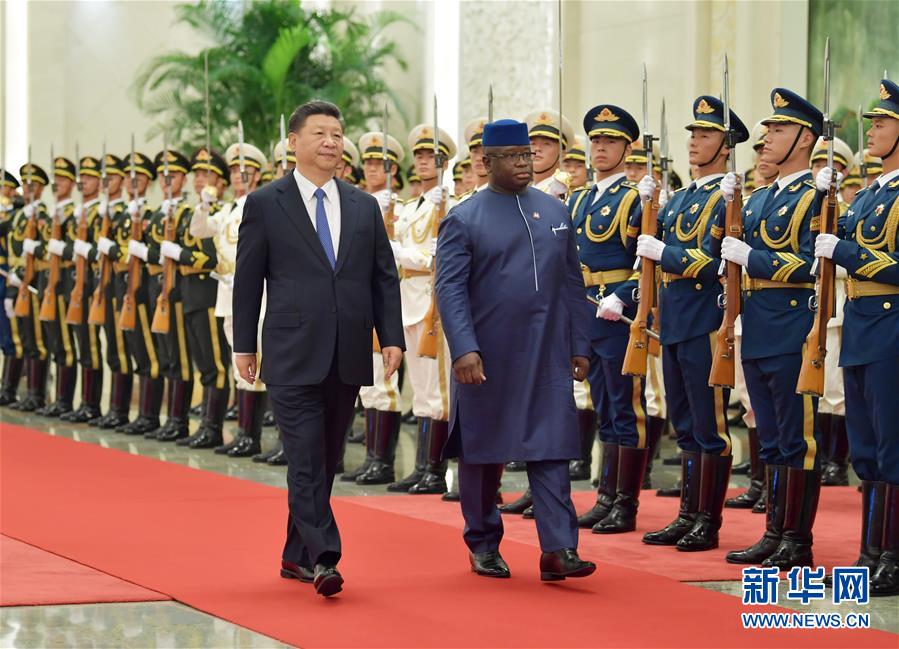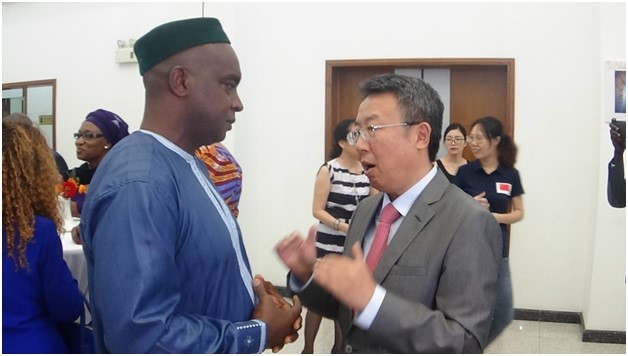


Chinese President Xi Jinping and President of Sierra Leone Julius Maada Bio review an honor guard during a welcome ceremony in Beijing, Aug. 30, 2018.
Sierra Leone joined other African countries in the 2018 Beijing Summit of the Forum on China-Africa Cooperation (FOCAC), which gathers friends and pools wisdom for bilateral and multilateral cooperation between African countries and China, held in Beijing on Sept 3-4, 2018.
The Government of Sierra Leone first established diplomatic relations with the Government of the People’s Republic of China on July 29, 1971. 47 years on, this relationship has developed immensely based on mutual understanding, respect and friendly cooperation between the two countries. Respect for each other’s core political, social and economic interests have bound the two countries throughout the decades.
China is a genuine friend to Sierra Leone and has always responded positively when the government in Sierra Leone asks for help. For a long time, China has supported Sierra Leone in its development, and has also been on hand in moments of national or natural disaster. For example, China supported Sierra Leone through logistical, human and financial issues when the country fell victim to the Ebola outbreak, the mudslide and the more recent monthly national cleaning exercise.
Chinese intervention in such areas as agriculture, infrastructure, transport, education and health continues to serve as an embodiment of great economic prosperity that this country yearns for. For example, the Sierra Leone - China Friendship Hospital is one of the best in the country.
One of the main subjects discussed in regards to win-win cooperation between the two countries is the promotion of human resource development in Sierra Leone. Chinese companies have trained thousands of Sierra Leoneans in various fields, while compared with any other African country, Sierra Leone has received the largest number of Chinese government scholarships.

Sierra Leone’s Foreign Minister Dr. Alie Kabba and Chinese Ambassador to Sierra Leone Wu Peng discuss development issues in Freetown.
Hundreds of scholarships are provided annually so that Sierra Leoneans can pursue various courses in China, not to mention the short and long-term courses available for government officials, journalists and other professionals.
Tangible infrastructural support provided by China includes bridges, government buildings, stadiums (Bo Mini Stadium and Siaka Stevens Stadium) and roads, including the Regent to Kossoh road project, as well as ongoing electricity projects such as the Charlotte, Bankasoka and Makali hydro-power stations.
China has emerged as a trusted trade and investment partner in countless development areas.
Prior to the 2018 general election, the administration frowned upon the past government’s relationship with the Chinese. During the election campaign, the then opposition referred to Sierra Leone as a Chinese state due to the numerous Chinese investments in the country. This led to President Bio’s promise to review major agreements signed between the past government and China. Many ongoing Chinese projects were stalled and the payments to Chinese suppliers such as road construction companies were ceased.
These decisions were perhaps influenced by Western media, who raised concerns regarding the past government's cooperation with the Chinese to construct the $300 million Mammamah Airport and further negotiations with a Chinese company to construct a bridge linking Freetown with the current international airport at Lungi.
Sierra Leoneans, despite their political affiliation, remain grateful to China. They cannot be easily twisted or influenced by the West to end ties with China. The current president, Julius Maada Bio, has realized that China provides more development opportunities to Africa compared with any Western nation.
His visit to China yields greater opportunities, as he has already signed development cooperations with the Chinese government in areas such as infrastructure, agriculture, education and health. He has also held discussions with a Chinese enterprise, PowerChina, to construct the Lungi Bridge. Some members of his delegation, including his Minister of Transport, have also spoken with a Chinese bus manufacturing company, Golden Dragon, which will supply Sierra Leone with 200 brand-new buses.
The Chinese government is ready and willing to engage with development-oriented governments like the current Bio Administration, to the highest state level at the earliest possible opportunity, to move the already comprehensive and strategic partnership between the two countries to greater heights.
This is the opportunity Sierra Leone needs to enable the country to catch up with others, and so it remains good news that ties between the two countries continue to grow.
 Fire brigade in Shanghai holds group wedding
Fire brigade in Shanghai holds group wedding Tourists enjoy ice sculptures in Datan Town, north China
Tourists enjoy ice sculptures in Datan Town, north China Sunset scenery of Dayan Pagoda in Xi'an
Sunset scenery of Dayan Pagoda in Xi'an Tourists have fun at scenic spot in Nanlong Town, NW China
Tourists have fun at scenic spot in Nanlong Town, NW China Harbin attracts tourists by making best use of ice in winter
Harbin attracts tourists by making best use of ice in winter In pics: FIS Alpine Ski Women's World Cup Slalom
In pics: FIS Alpine Ski Women's World Cup Slalom Black-necked cranes rest at reservoir in Lhunzhub County, Lhasa
Black-necked cranes rest at reservoir in Lhunzhub County, Lhasa China's FAST telescope will be available to foreign scientists in April
China's FAST telescope will be available to foreign scientists in April "She power" plays indispensable role in poverty alleviation
"She power" plays indispensable role in poverty alleviation Top 10 world news events of People's Daily in 2020
Top 10 world news events of People's Daily in 2020 Top 10 China news events of People's Daily in 2020
Top 10 China news events of People's Daily in 2020 Top 10 media buzzwords of 2020
Top 10 media buzzwords of 2020 Year-ender:10 major tourism stories of 2020
Year-ender:10 major tourism stories of 2020 No interference in Venezuelan issues
No interference in Venezuelan issues
 Biz prepares for trade spat
Biz prepares for trade spat
 Broadcasting Continent
Broadcasting Continent Australia wins Chinese CEOs as US loses
Australia wins Chinese CEOs as US loses